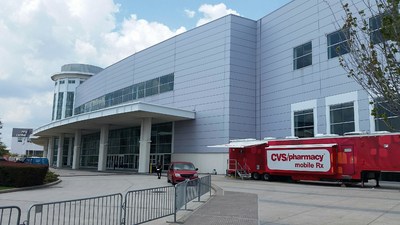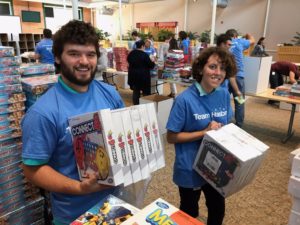GCRI Members Support Relief Efforts
Tufts Health Plan Foundation
The Tufts Health Plan Foundation matched employees’ contributions to nonprofit organizations providing hurricane relief to communities affected by Hurricane Harvey and Irma. 150 Tufts Health Plan employees and board members donated nearly $23,000, and the Foundation match meant that $45,000 were given for relief efforts. Hurricane Harvey donations were given to the American Red Cross, Massachusetts Chapter. For Hurricane Irma, the donation was given to One America Appeal.
Tufts Health Plan was also one of the first organizations to partner with the Massachusetts United for Puerto Rico effort, committing a minimum of $50,000 to this effort to help Puerto Rico, which was hit by both Hurricane Irma and Hurricane Maria. The Tufts Health Plan Foundation will match two-to-one employee donations to nonprofit organizations providing relief in Puerto Rico. The Foundation match will be directed to The Latino Legacy Fund at The Boston Foundation, which is partnering with the Alliance for Puerto Rico to support those who have seen their community devastated by the recent storms. Money raised through this fund will be distributed immediately for relief efforts and deployed during the next two years for reconstruction and economic recovery projects. Additionally, the fund will make grants to support resettlement efforts here in Massachusetts in response to the substantial migration of Puerto Ricans who are expected to arrive here in the months ahead.
Collette
Collette matched employee donations up to $5,000. The company’s foundation is also making a donation of $10,000 to Save the Children for their efforts in support of Hurricane Harvey relief. Save the Children provided supplies and resources to support children in shelters, and will be supporting organizations providing trauma support for children and families as they recover and rebuild. They will also be providing funding and support to rebuild childcare facilities affected by the flooding.
Hasbro
Through its Play Relief program, Hasbro donated 15,000 toys and games to hurricane shelters and family support programs. Employees volunteered to pack the kits. Hasbro also donated $50,000 to the American Red Cross and matched employee donations up to $25,000.
Pawtucket Credit Union
Pawtucket Credit Union is matching employee donations to the American Red Cross Hurricane Relief Fund.
CVS Health
GCRI Member CVS Health has deployed emergency pharmacy resources and general assistance to the victims of Hurricane Harvey. A mobile pharmacy unit was set up outside the NRG Center in Houston, where evacuees were now able to pick up prescriptions, purchase over-the-counter medications and receive recommended vaccines.

Additionally, CVS Pharmacy, in cooperation with the Texas Department of State Health Services, will provide pharmacy services to Texas residents who have been displaced by the Hurricane through “pop up” pharmacies that are being deployed at emergency shelters in Austin, Dallas and San Antonio. “Pop up” pharmacies place pharmacists and pharmacy personnel at the shelters to counsel patients and facilitate the delivery of prescriptions from nearby pharmacies. These new actions follow a donation from the CVS Health Foundation announced earlier this week of $200,000 towards relief and recovery efforts, which includes $50,000 each to the Greater Houston Community Foundation and the American Red Cross, as well as $25,000 to Salvation Army, to aid the greater Houston area in supporting local residents as they begin the recovery and rebuilding process. The CVS Health Foundation will also match colleague donations up to $25,000. In addition, CVS Health has donated more than $90,000 worth of in-kind products including personal hygiene, clean-up and over-the-counter items to area shelters and continues to work with shelters throughout Texas to support those displaced.
CVS also provided toiletry and hygiene donations to those displaced by the California wildfires.
Bank of America
GCRI Member Bank of America’s Hurricane Harvey Relief efforts have included sending mobile financial centers and mobile ATM’s to the region, and nearly $2 million in donations from the company, its foundation and its employees. The company is matching employee donations through an internal program, and to date, bank employees have donated $457,000, matched dollar for dollar by the company for a total of $914,000. Those funds will be distributed to charities selected by the donating employees. That amount is in addition to $1 million in relief funding provided by the Bank of America Charitable Foundation, with $250,000 directed through the American Red Cross Disaster Relief Fund and the remainder to be allocated as the company learns more about specific recovery needs.
“We are activating our resources to bring relief to the individuals, families, customers and communities that will continue to be impacted by the unprecedented challenges Harvey is creating across the region,” said Hong Ogle, Houston market president for Bank of America. “We are humbled and heartened by the outpouring of support.”
United Way Worldwide
- United Way Worldwide has established multiple funds for relief and recovery efforts. There is a United Way Worldwide Mexico Earthquake Recovery Fund, a United Way Irma Recovery Fund that also includes Hurricane Maria, and United Way Harvey Recovery Fund. The Hurricane Harvey Fund began disbursing support in mid-September. All three funds are accessible from unitedway.org/recovery.
LISC
LISC has committed $100 million to Hurricane Harvey recovery work, both in Houston and in hard-hit rural counties in Texas and the Gulf Coast. It will be working with new and existing partners and funders to expand this investment through grants, loans and equity assistance—especially in underinvested communities, where LISC has a long history. More info
If you are a GCRI member, and have been active in supporting hurricane relief efforts in other ways, let us know!

